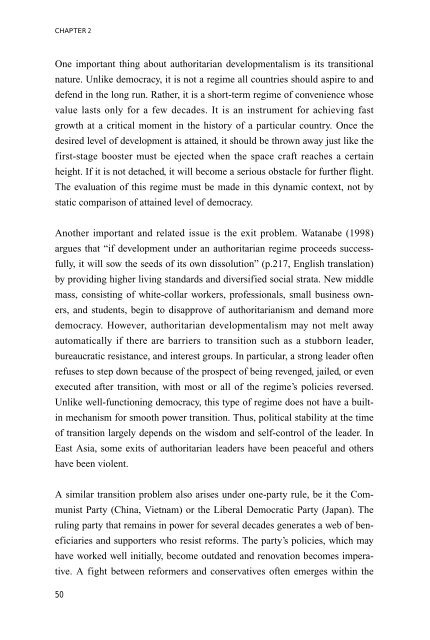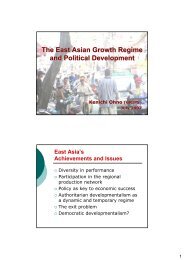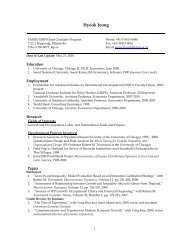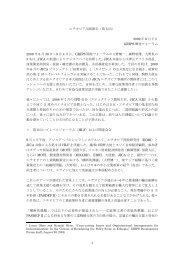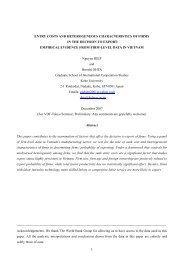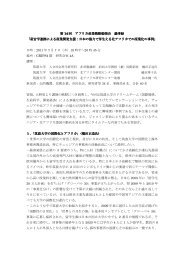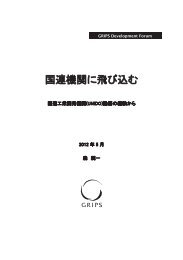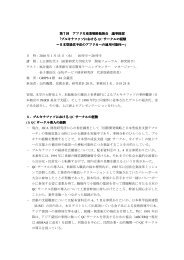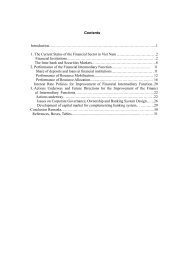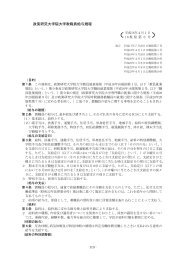The East Asian Growth Regime and Political Development*
The East Asian Growth Regime and Political Development*
The East Asian Growth Regime and Political Development*
Create successful ePaper yourself
Turn your PDF publications into a flip-book with our unique Google optimized e-Paper software.
CHAPTER 2<br />
One important thing about authoritarian developmentalism is its transitional<br />
nature. Unlike democracy, it is not a regime all countries should aspire to <strong>and</strong><br />
defend in the long run. Rather, it is a short-term regime of convenience whose<br />
value lasts only for a few decades. It is an instrument for achieving fast<br />
growth at a critical moment in the history of a particular country. Once the<br />
desired level of development is attained, it should be thrown away just like the<br />
first-stage booster must be ejected when the space craft reaches a certain<br />
height. If it is not detached, it will become a serious obstacle for further flight.<br />
<strong>The</strong> evaluation of this regime must be made in this dynamic context, not by<br />
static comparison of attained level of democracy.<br />
Another important <strong>and</strong> related issue is the exit problem. Watanabe (1998)<br />
argues that “if development under an authoritarian regime proceeds successfully,<br />
it will sow the seeds of its own dissolution” (p.217, English translation)<br />
by providing higher living st<strong>and</strong>ards <strong>and</strong> diversified social strata. New middle<br />
mass, consisting of white-collar workers, professionals, small business owners,<br />
<strong>and</strong> students, begin to disapprove of authoritarianism <strong>and</strong> dem<strong>and</strong> more<br />
democracy. However, authoritarian developmentalism may not melt away<br />
automatically if there are barriers to transition such as a stubborn leader,<br />
bureaucratic resistance, <strong>and</strong> interest groups. In particular, a strong leader often<br />
refuses to step down because of the prospect of being revenged, jailed, or even<br />
executed after transition, with most or all of the regime’s policies reversed.<br />
Unlike well-functioning democracy, this type of regime does not have a builtin<br />
mechanism for smooth power transition. Thus, political stability at the time<br />
of transition largely depends on the wisdom <strong>and</strong> self-control of the leader. In<br />
<strong>East</strong> Asia, some exits of authoritarian leaders have been peaceful <strong>and</strong> others<br />
have been violent.<br />
A similar transition problem also arises under one-party rule, be it the Communist<br />
Party (China, Vietnam) or the Liberal Democratic Party (Japan). <strong>The</strong><br />
ruling party that remains in power for several decades generates a web of beneficiaries<br />
<strong>and</strong> supporters who resist reforms. <strong>The</strong> party’s policies, which may<br />
have worked well initially, become outdated <strong>and</strong> renovation becomes imperative.<br />
A fight between reformers <strong>and</strong> conservatives often emerges within the<br />
50


